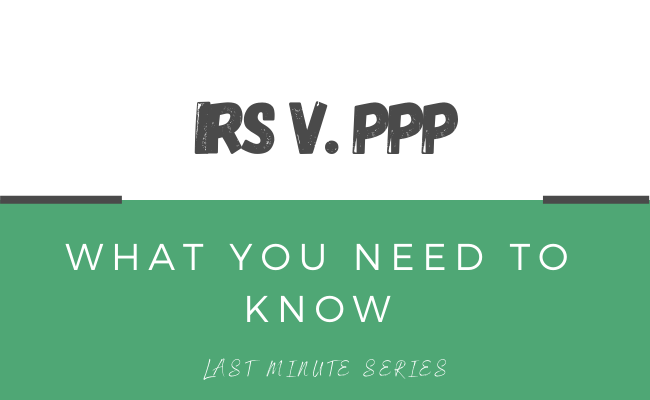IRS v PPP: What You Need to know as of December 1
IRS Efforts to Destroy Tax Deductions for PPP Paid Expenses
It seems like Mommy and Daddy are fighting (You can chose who is Mommy and who is Daddy!)

The IRS and the Lawmakers who created the CARES and PPP have been bumping heads since almost the beginning.
When lawmakers originally passed the PPP, they thought that under its provisions
- You did not pay taxes on the forgiveness amount
- You also could deduct the expenses that you paid with the PPP money.
Sounded fairly simple, The IRS doesn’t see it that way.
The IRS doesn’t wear rose colored glasses!
Strike 1: Back in April of this year, the IRS issued a notice asserting PPP loan recipients may not deduct business expenses paid using the PPP monies. (Oh Damn!)
This brought in to question what exactly is forgivable?
Lawmakers’ Hit Back
In a May 5, 2020, letter to Secretary of the Treasury Lawmakers jointly stated that the IRS got this wrong and that the intent of the CARES Act was for the PPP to be a tax-free grant.
OOOOO Burn!
The IRS Scoffed at the letter
(Insert audible laugh and toss of scarf over the shoulder here.)
Unmoved by the letter, the IRS position was clear.
- No deduction for the expenses paid with the PPP money.
- The way that the lawmakers enacted the law created the problem.
To fix it, lawmakers simply need to pass a new law.
You would think this simple solution would have been done by now… I’ll let you guess.
Death and Taxes: The IRS strikes again
This past month, the IRS struck 2 more blows against PPP Forgiveness.
- Strike 1: Revenue Ruling 2020-27, the IRS ruled that you may not deduct expenses paid with the PPP loan monies if you have received or expect to receive forgiveness of those loan monies.
- Strike 2. Revenue Procedure 2020-51, the IRS set forth safe-harbor procedures to follow if your PPP forgiveness is subsequently denied or if you decide not to apply for forgiveness.
With the rulings described above, the IRS has clarified its position and clearly stated to lawmakers: if you don’t like the non-deductibility of expenses paid with PPP monies, change the law.
Again, with Lawmakers and loggerheads in Washington, nothing has been done to fix this potentially detrimental shortfall in the law.
What this actually means for you…
You are not completely losing here. Since the PPP is not considered an Income but assistance or a grant if you will; you do not have to pay taxes on it. (Yay win for you)
You just cant deduct the expenses because technically, its not an income.
Ever heard of a catch-22?
Proprietors and Partners
At the moment, you seem to have a “Get out of jail free” card! How you ask? The self-employed taxpayer with no employees forgiveness is based on their 2019 Schedule C net income.
The IRS gives no guidance on how it will treat the money spent by Form 1040 Schedule C filers. At least not yet, if something changes we will be sure to let you know.
But most proprietors with no employees obtain full forgiveness with no spend on rent, interest, or utilities.
The same is true for partnerships and distributions to partners.
Potential Trouble for Your Section 199A Deduction
If your Section 199A deduction depends on payroll, your inability to deduct payroll costs paid with PPP money will cost you some.
What to Do Now
Join with hundreds of thousands of business taxpayers and tax professionals who are urging lawmakers to fix the non-deductibility issue.
To help encourage the action you desire (whether you’re for or against deductibility), get in touch with your state’s lawmakers.
YOUR VOICE CAN EFFECT CHANGE!
3612 is the Senate bill to make the PPP forgiveness money used to pay business expenses tax deductible.
To express your yea or nay on S. 3612, contact your senators. You can find them at this link: https://www.senate.gov/senators/contact.
H.R. 6821 is the House bill to make the PPP forgiveness money used to pay business expenses tax deductible.
To express your yea or nay on H.R. 6821, contact your representative. You can find him or her at this link: https://www.house.gov/representatives.
You can fax, email, or phone and simply say you support or oppose the bill. It’s that easy—and it’s effective. Do it.





